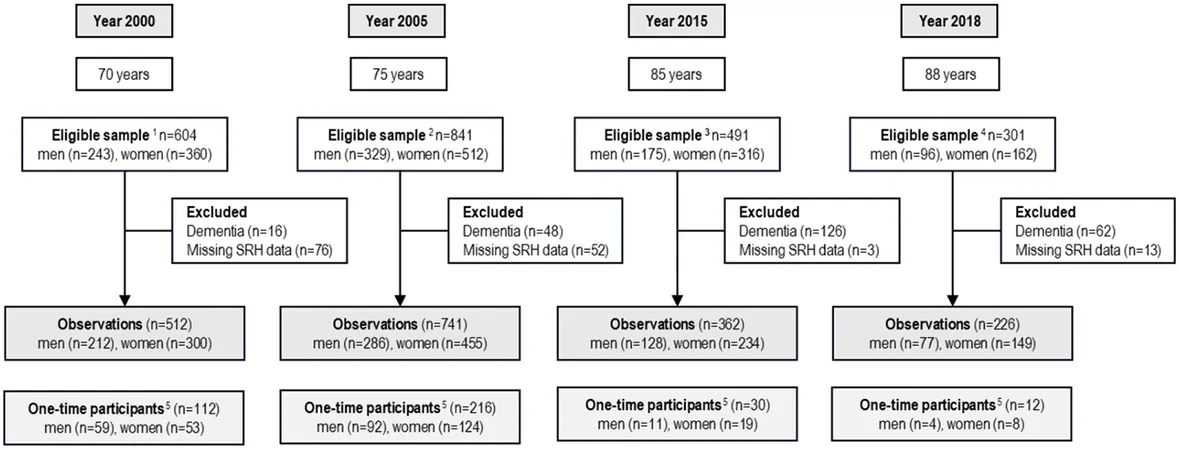
Unlocking the Secrets of Health Perception in Aging: Insights from the Gothenburg H70 Study
2025-04-24
Author: Daniel
Understanding Self-Rated Health in Older Adults
Self-rated health (SRH) serves as a vital gauge of how individuals assess their overall health status. This convenient self-assessment is not only a reflection of physical health but a strong predictor of disability and mortality. The question posed—"In general, how would you rate your health?"—leads individuals to synthesize various health dimensions that rigid questionnaires often overlook.
The Complex Landscape of Health Perception
Despite its significance, our grasp of what drives people to rate their health as poor or excellent is limited. Jylhä’s influential model explains SRH as an intricate mix of health-related experiences—medical conditions, functional abilities, and psychological well-being. As people age, the criteria they use to evaluate their health may shift, demonstrating response shifts that reflect their changing contexts.
Key Factors Influencing Self-Rated Health
Research has spotlighted various factors influencing SRH in older adults, including chronic illnesses, functional impairments, and mental health. As we age, there's evidence suggesting that the connections between physical health and SRH evolve; psychosocial elements gain prominence, potentially buffering against the impacts of illness and decline.
Exploring the Gothenburg H70 Study
Within the Gothenburg H70 studies, researchers focused on adults born in 1930, observing changes in SRH at ages 70, 75, 85, and 88. This comprehensive study involved 939 participants, accumulating 1,841 health assessments over several years, enabling a deep dive into how SRH fluctuates with age.
Notable Findings on Aging and Health Ratings
Participants reported varied health perceptions as they aged. By 75 years, about 30% rated their health as poor, likely a reflection of accumulated health challenges. Surprisingly, only 15% of those aged 88 showcased poor SRH. This suggests a shift in perspective—older individuals might adapt their expectations and coping strategies, contributing to better health self-assessments despite declining health.
The Role of Life Satisfaction
Throughout the study, satisfaction with life remained stable across ages, highlighting the importance of psychological factors in health perception. High levels of life satisfaction correlated with better SRH. Interestingly, when adjusting for life satisfaction, the direct associations between loneliness and poor health ratings diminished, indicating that positive emotional states may enhance resilience against health declines.
Significance and Implications of the Study
This research underscores the dynamic interplay between physical health, mental well-being, and the overall perception of health as individuals age. It reveals the need for a holistic approach in understanding SRH, advocating for more nuanced care strategies that address not only physical ailments but also promote psychological well-being.
Final Thoughts on Age, Health, and Perception
In conclusion, as our understanding of self-rated health evolves, so too must our strategies to support aging populations. The findings from the Gothenburg H70 study illuminate the ever-changing landscape of health perceptions and highlight the importance of considering both physical and psychosocial factors in promoting healthier, more fulfilling aging experiences.



 Brasil (PT)
Brasil (PT)
 Canada (EN)
Canada (EN)
 Chile (ES)
Chile (ES)
 Česko (CS)
Česko (CS)
 대한민국 (KO)
대한민국 (KO)
 España (ES)
España (ES)
 France (FR)
France (FR)
 Hong Kong (EN)
Hong Kong (EN)
 Italia (IT)
Italia (IT)
 日本 (JA)
日本 (JA)
 Magyarország (HU)
Magyarország (HU)
 Norge (NO)
Norge (NO)
 Polska (PL)
Polska (PL)
 Schweiz (DE)
Schweiz (DE)
 Singapore (EN)
Singapore (EN)
 Sverige (SV)
Sverige (SV)
 Suomi (FI)
Suomi (FI)
 Türkiye (TR)
Türkiye (TR)
 الإمارات العربية المتحدة (AR)
الإمارات العربية المتحدة (AR)